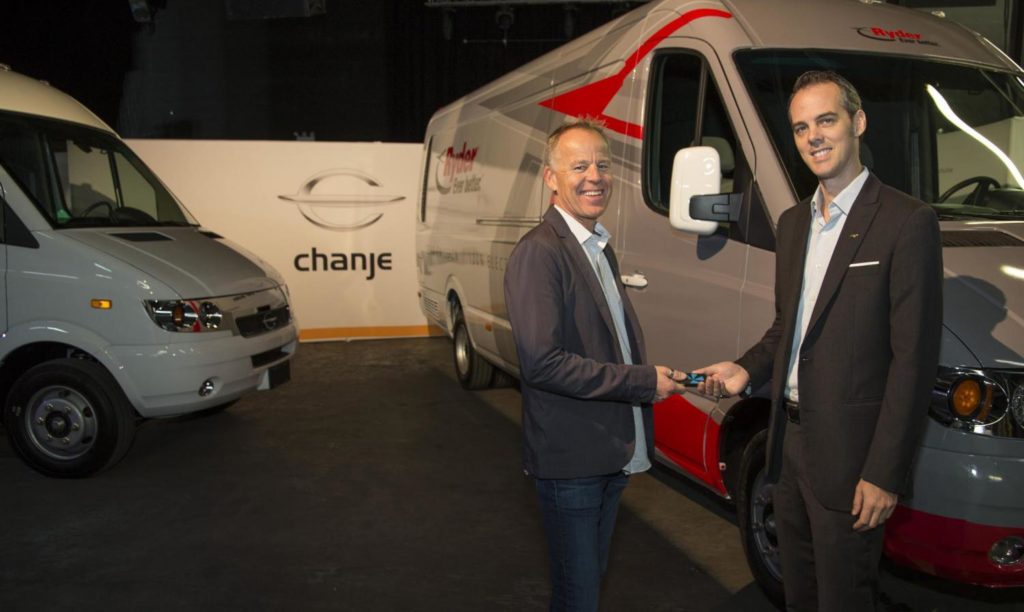Miami, November 2, 2017 —Ryder System, Inc. (NYSE: R), a leader in commercial fleet management, dedicated transportation, and supply chain solutions, announced today it has started to take delivery of 125 medium-duty electric panel vans, the first of their kind in North America, now available for lease or rent. The vehicle order follows the exclusive sales channel and electric vehicle service partnership that Ryder recently announced with Chanje Energy in August and consists of Chanje’s medium-duty electric vehicle. The Chanje all-electric large delivery style van is equipped to haul up to 6,000 pounds and up to 580 cubic feet of cargo, all with zero vehicle exhaust emissions. Ryder also plans to equip its maintenance facilities in the San Francisco, Los Angeles, San Diego, Sacramento, and San Jose, Calif. markets, as well as in the Chicago and New York markets, with the latest technology in commercial electric vehicle (EV) charging.
Information & Updates
Reaching the Supply Chain Sustainability Tipping Point
Since the 1990’s I’ve been writing about sustainability, cap & trade and carbon footprints mainly in the realm of logistics and supply chain as that’s where I live.
Supply chains are incredibly important in this context as roughly 75% of most company’s carbon footprint emanates from their supply chain.
My mantra throughout this time has been ‘when not if’ these measures will be enacted and today I have to say we’re rapidly approaching the tipping point for supply chain sustainability.
Early ‘Internet of Things’ Pilots Proved Supply Chain Benefits of RFID Pallets
 Two early pilots were facilitated by Supply Chain Network and carried out in 2003 and 2006 with both representing successful demonstrations of the potential supply chain benefits available through ‘Internet of Things’ implementations.
Two early pilots were facilitated by Supply Chain Network and carried out in 2003 and 2006 with both representing successful demonstrations of the potential supply chain benefits available through ‘Internet of Things’ implementations.
Key to both of these pilots were RFID enabled pallets and the first project was the SCN Grocery Pilot which was carried out utilizing RFID at the pallet level for automated Distribution Centre (DC) receiving.
For the second pilot in the Office Products Industry, a combination of both pallet level and case level RFID was utilized to deliver significant results for both automated Distribution Centre Receiving and automated Direct to Store Delivery receiving.
Herman E. Daly: A Steady-State Economy
From SDC(UK): The Earth as a whole is approximately a steady state. Neither the surface nor the mass of the earth is growing or shrinking; the inflow of radiant energy to the Earth is equal to the outflow; and material imports from space are roughly equal to exports (both negligible). None of this
means that the earth is static—a great deal of qualitative change can happen inside a steady state, and certainly has happened on Earth. The most important change in recent times has been the enormous growth of one subsystem of the Earth, namely the economy, relative to the total
system, the ecosphere.
Could a New Pallet Be the Starting Point for More Sustainable Supply Chains?

A bold statement perhaps, but one borne out of long standing frustration with the slow if not stagnant forward movement towards implementing more sustainable supply chains.
In 1985 I established my first retail store cardboard recycling initiative which not only was good for the environment, but was also a financially lucrative initiative saving the Hudson’s Bay Company $100’s of thousands of dollars annually at that time.
Can Modern Transport Airships Change the World?
Over the last couple of years my interest and excitment around the concept of reviving and renewing airship transport technology of the blimp or zeppelin variety has been growing steadily. Today I’m now utterly convinced these massive dinosaurs of the sky from the early 1900s actually have the potential to re-emerge and change our world for the better. Can Modern Transport Airships Change the World?
Paragon’s Carbon Minimizer cuts truck emissions and gas costs
In a bid to help improve the environmental efficiency of the thousands of Paragon planned trucks around the world, Paragon Software Systems has added a new Carbon Minimizer option to its routing, scheduling and transportation optimization software. The Carbon Minimizer enables users to further reduce the carbon and fuel content of their planned schedules, so cutting both carbon footprint and operating costs.
The Role of Logistics and Transport in Reducing Supply Chain Carbon Emissions
From weforum.org: “Significant movement is expected towards reduced supply chain carbon intensity. This will create both opportunities and risks for logistics and transport firms, with changes in supply and demand driven by: Regulation of carbon emissions, Higher and more volatile fuel prices, as well as Evolving consumer and client demand. The sector can play an influential role in decarbonization, both in its own operations and through broader supply chain optimisation. This provides direct benefits through reduced costs, managed risks and business growth.”
David Suzuki vs. Walmart CEO: The 2010 Walmart Canada Green Business Summit Recap
A Walmart business summit, with keynote speech by Dr. David Suzuki. How could these two seemingly opposed global forces exist in the same confined space? This I had to see.
The sun was just rising as I wheeled up to Vancouver’s Pan Pacific Hotel, to find out what Walmart had up its sleeve when it invited 350 top retail execs and competitors for the Walmart Canada Green Business Summit.
The Mayor, the Premier, environmental alarm, sustainability case studies, live wireless polling, this show had it all. I even got to ask the Walmart CEO, face-to-face, about their business model and position on packaging take-back recycling.
This blog is going to run on a bit, but I wanted to keep all of the info in one document, so grab an organic java and get comfortable. David Suzuki vs. Walmart CEO: The 2010 Walmart Canada Green Business Summit Recap
NAFTA partners eye continental carbon scheme
From The Globe and Mail: “The United States has agreed to work with Canada and Mexico to develop a North American carbon market that would allow Canadian emitters to meet some portion of their targets through purchasing credits in the vast NAFTA marketplace. The agreement by leaders from the three countries could help keep down compliance costs for Canadian emitters, while expanding the market for renewable energy companies and others that create carbon credits with projects in Canada. “This is the first time the three North American leaders have been together and have started to flesh out the elements of a continental approach to this,” Environment Minister Jim Prentice said in a telephone interview.”

